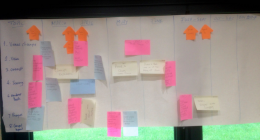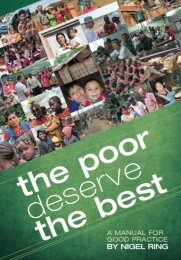 So far we have seen how to consider different issues related to the ministry and have captured ideas for improvement. We now need to take these forward to a finalised Action Plan.
So far we have seen how to consider different issues related to the ministry and have captured ideas for improvement. We now need to take these forward to a finalised Action Plan.
4. Identifying and agreeing improvements to be made
By the end of Day 1 many sheets of notes have been blue-tacked to the walls of the room. On Day 2 we take each of the issues discussed on Day 1 and dig deeper until we have specific actions that all can agree need to be taken. By this stage there is an ever-growing participation and enthusiasm from the team members. Often they have had great thoughts overnight and have further contributions to bring following reflection about the process.
We start by prioritising the list of topics that we wish to discuss so that we can be sure that the most important are dealt with first. These are then captured on further sheets of paper to form the basis of an Action Plan. At this point, too, we ensure that each action point has been allocated to one of the team members and clarity is confirmed that they know exactly what is required.
5. Timeline
It is easy to write a list of things to do and assume that they will all get done. How many of us make ‘do it’ lists and think that by so doing we have accomplished a task! But until the action is on a timeline, which is agreed by the whole team, I do not consider the Action Plan has been completed. We do this is the third step in the process. It is also important to ensure that there is a clearly recognised context for accountability, so meetings are built in to the timeline at which feedback will be given on the relevant action points.

6. Action Plan
Clearly it is unwieldy to work from many sheets of flip chart paper – I in fact prefer to use lining wall-paper as this can then be cut to a length to suit the need – so one member of the team is charged with the responsibility of writing the Action Plan into a document. A team member doing this helps ensure ownership of the plan.
Conclusion
Evaluating a ministry in this way results in an effective and well thought-through activity. Each member of the team has ownership of the ministry and, most important, the people being helped (I dislike the word ‘client’) receive the greatest benefit from the ministry being offered.
 The process is enjoyable and people leave it with added enthusiasm and ‘buzz’. Team building is strengthened through the process and often previously hidden issues have been addressed in an atmosphere of cooperation and mutual respect.
The process is enjoyable and people leave it with added enthusiasm and ‘buzz’. Team building is strengthened through the process and often previously hidden issues have been addressed in an atmosphere of cooperation and mutual respect.
The Poor Deserve the Best
A fuller treatment of the Ministry Health Check is included in The Poor Deserve the Best, see side panel.
Planning Foundations
A similar process has been developed for planning a ministry from scratch. Here we take the various Key Indicators and consider how they apply to the ministry being planned. The result of the process is a document which provides the basis for setting up and launching a ministry.
